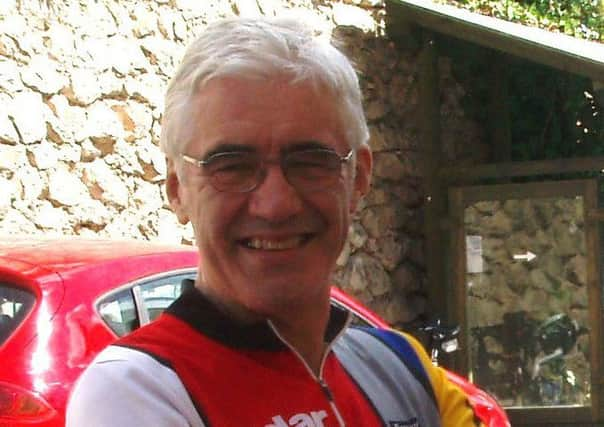Obituary: Douglas James Gillespie, surveyor, assessor, electoral registration officer and member of Lands Tribunal


Douglas Gillespie, the former assessor to the Highland and Western Isles Valuation Joint Board and electoral registration officer for Highland Council and, latterly, a member of the Lands Tribunal for Scotland – where his keen intelligence was highly valued by his fellow members – died in Raigmore Hospital, Inverness, from lung cancer. He was 64.
Gillespie was born in Stirling, where his father, Ronald, was company secretary for Col Sir David Stirling’s estate in Dunblane. The family lived at St Ninians, moving to Bridge of Earn when Ronald became the accountant for Balmanno Estates. The 14-year-old Douglas transferred from the High School of Stirling to Perth Academy and he sought a summer job working on the River Tay fisheries, where his lifelong attraction to the outdoor life found early expression.
Advertisement
Hide AdAdvertisement
Hide AdA sharply contrasting environment presented itself when he joined Dundee City Assessor’s office as a trainee chartered surveyor in 1972 and gained his senior qualification the following year. The North Sea oil and gas boom was in its exciting infancy and when Douglas moved in 1974 to the Glasgow office of Gerald Eve, the international property consultants and chartered surveyors, he specialised in the rating appeal portfolio, which included onshore developments.
At this time Scotland’s east coast local authorities eyed the offshore bonanza covetously and a ferment of interest was whipped up when Fife proposed to impose business rates on the North Sea platforms – and on the Fife-side portions of the Forth and Tay bridges – on the grounds that the county supplied them with police, fire and medical services.
While Fleet Street columnists conjured visions of Auchtermuchty and Lochgelly basking in Saudi-style opulence, exemptions were swiftly put in place to put an end to the improbable prospect.
Douglas’s responsibilities with Gerald Eve extended to rating appeals in England – Newcastle and Sunderland were the responsibility of the Glasgow office – and he joined the asset valuation team, dealing with Marks & Spencer and Tarmac, but his taste for rural endeavour prompted him to return to the Tay fisheries. He was allocated a live-in bothy at Inchyra where, after work shifts, he read numerous studies of philosophy, history and religion and where he welcomed close friends to a roaring fire, a dram and debate long into the Perthshire nights.
Douglas returned to surveying with Strathclyde Regional Council’s assessor’s department in Glasgow, where he met Iris Clarke, a speech therapist whom he subsequently married, and he became an area valuer with Central Regional Council in 1985 to be nearer the cottage he had bought in Killin. He proposed that he and Iris should live there according to sound ecological principles, using John Seymour’s writings on self-sufficiency as a guide.
At Douglas’s funeral, Iris recollected that on their acre of land, “a marsh was turned into a lawn, a steep bank was revised to make it easier to mow (turned out we had desecrated a section of General Wade’s road!), seven rockeries were constructed, several outhouses were converted for future livestock, fences were erected, stiles were built and the thick forest around the edge of the property was significantly thinned out”.
Iris also revealed that her Christmas gift from Douglas that year was a copy of Practical Goat Keeping for Beginners. Goats did not materialise, unlike the bees he kept for several years, but the entire enterprise was abandoned in 1988 when Douglas was appointed depute assessor to the Highland and Western Isles Valuation Joint Board, becoming assessor in 1996, by which time he and Iris had begun to raise their family in Inverness.
As assessor, Douglas was not averse to the use of psychological tactics during rates valuation negotiations. “In the middle of a long and detailed discussion he would propose a break for lunch and, when we resumed at 2.30pm, Douglas would enquire solicitously if you would be staying the night, knowing that you had a four-hour drive back to Glasgow and just wanted to get the matter settled as quickly as possible,” is the amused testimony of one of his former adversaries.
Advertisement
Hide AdAdvertisement
Hide AdDouglas retired as assessor in 2014 and became a member of the Lands Tribunal for Scotland, where his attention to detail and enjoyment of debate earned affectionate respect. In correspondence during Douglas’s final illness, Lord Minginish, president of the LTS, wrote: “Your formidable ability was combined with good grace and tolerance. You put up with your legal colleagues even when you knew fine we were wrong. Your electric intelligence cut to the core of matters in seconds.”
When not debating with law lords and advocates, Douglas frequently embarked on demanding expeditions through the Highlands with fellow members of his Inverness cycling fraternity, whom he named “The Scroats” (sic), although his zeal sometimes outstripped his navigation skills and he would discover belatedly that the peloton behind him had stayed on course while he veered off along some one-track road to nowhere, clad in his unmistakable retro-chic Mondrian-inspired top.
He spent his final months in Raigmore Hospital, keeping abreast of such issues as Article 50 and Supreme Court judgments, while writing memorable farewell notes to former colleagues and old friends. Douglas Gillespie is survived by his wife, Iris, his daughter, Rachel, and sons Duncan and Graeme.
Christopher Haddow, QC and business rates expert, said of him: “His rigorous mastery of his subject and intellectual approach to the matter in hand impressed me. I relished the occasions when I cross-examined him perhaps as much as he relished seeing his way to avoid or head off points which I was intent on making.”
RODDY FORSYTH